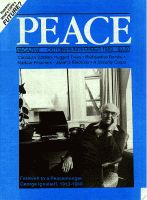
Peace Magazine Oct-Nov 1989, page 29. Some rights reserved.
Search for other articles by Edward Nixon here
The first Citizens' Assembly for Peace and Democracy is scheduled to be held in Prague, Czechoslovakia during May and June of 1990. It is dedicated to the goal of working "towards a united, democratic, multi-cultural, socially just, ecologically conscious, demilitarised Europe." Appropriately, considering the impact such a strategy has already had on reshaping Poland, the theme is "Civil society as a vehicle to overcome divisions in Europe."
The organizers include such long time peace activists as Mary Kaldor of Great Britain, Mient Jan Faber of the Netherlands, and such distinguished East European dissidents as Czech exiles Jan Kavan and Jirj Pelikan and Jacek Czaputowicz of Poland's Freedom and Peace. They view civil society as "citizens acting to-gether in self-organized associations, movements, institutions, initiatives and clubs across national and bloc boundaries." By such citizen movements independent of government, it is expected that "new social relationships" can be created and new "forms of dialogue and mutual understanding will emerge to overcome economic, political, national and cultural divisions."
The meeting is scheduled to be held in Prague, but organizers have alternative arrangements in Budapest, should continuing repression in Czechoslovakia make it necessary to change locations.
Jaroslov Sabata and Ruth Sormova, leading activists of Charter 77, were not allowed to travel to Budapest for an organizing committee meeting. Sormova's passport was confiscated only two days before her planned departure. The assembly organizers have protested the "continous repression of Czechoslovak independent activists" who continue to struggle for implementation of the Helsinki Accords and the recent International Covenant for Civil and Human Rights, which Czechoslovakia ratified.
Canadian naval forces are taking part in PACEX '89, a military exercise being conducted in the Asia-Pacific region by the U.S. and its Pacific allies in September/October, 1989. It may be the largest Pacific military' mobilization since World War II.
Japanese press reports reveal that PACEX '89 is premised on an all-out confrontation with the Soviet Union, a departure from previous wargames, which have been conducted on the premise of a limited conflict.
Contact: Patti Willis, Pacific Campaign to Disarm the Seas, Denman Island, B.C.604/335-0351.
BY EDWARD NIXON
Two nuclear industry issues are currenfly being targeted by Greenpeace and other ecological groups for special attention. One is the Cigar Lake uranium mine in Saskatchewan, the largest ore body currently under development plans in Canada. Recent judicial rulings regarding the Rafferty dam (which gave federal environment assessment guidelines the force of law) are the source of efforts to obtain a review of the Cigar Lake project. Peace activists are being encouraged to write to the Federal Minister of Energy, Jake Epp, at the House of Commons, Ottawa, Ontario K1A 0A6 to call for the end of this unnecessary and hazardous scheme.
Environmentalists have also targeted Ontario Hydro's plans to build four new 850 megawatt reactors in the province. Hydro has initiated a relentless lobbying efforL Not only are they pressuring Premier David Peterson, but they are trying both to soothe and frighten the public. Friendly TV ads offer a toll-free information hotline, while rhetoric about forgone manufacturing jobs and plant closures emanates from head office.
The campaigns to stop the four reactors has gained a heightened sense of urgency because of the recent approval of tritium exports. According to the Ontario Ministry of Energy's own data, 8,100 megawatts of power can be saved over the next ten years at aprice comparable to new power sources. Greenpeace is urging letters to be sent to Premier Peterson at his Queens Park office,H7A lA1. E
OTTAWA-Prime Minister Mulroney has appointed Margaret (Peggy) Mason as Canada's new Ambassador for Disarmament. Prior to her appointment (1981-83 and 1984-89) she was policy advisor to Joe Clark, most recently with responsibility for arms control, defence and international security issues, human rights issues, and East-West relations, and domestic women's issues. Her two stints as a policy advisor to Mr. Clark were separated by brief posting to Erik Nielsen's staff in 1983.
Before joining Mr. Clark in 1983, Ms. Mason worked with two Ottawa law firms. Her most notable activity outside Tory circles was as legal advisor to the Canadian Advisory Council on the Status of Woman, in 1980/81. Ms Mason has expressed her intention of continuing Douglas Roche's consultative approach, having closely followed the reports of his Consultative Group. All good wishes to her!

Peace Magazine Oct-Nov 1989, page 29. Some rights reserved.
Search for other articles by Edward Nixon here